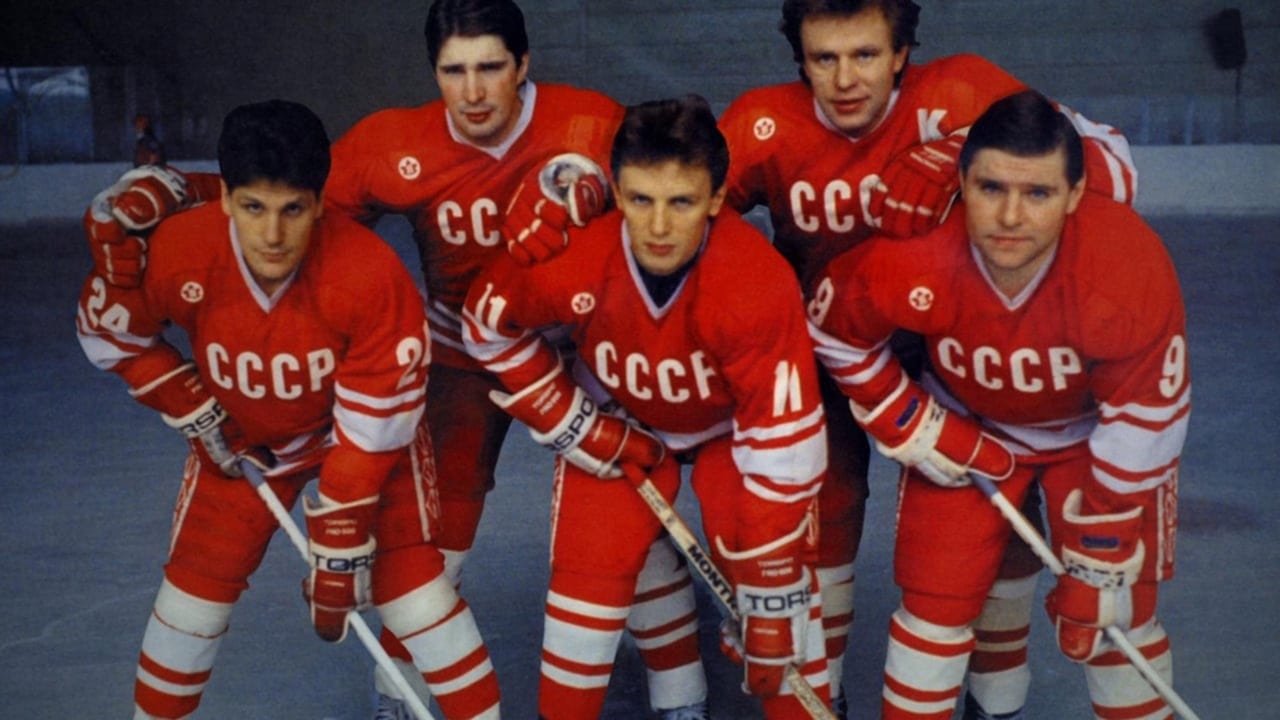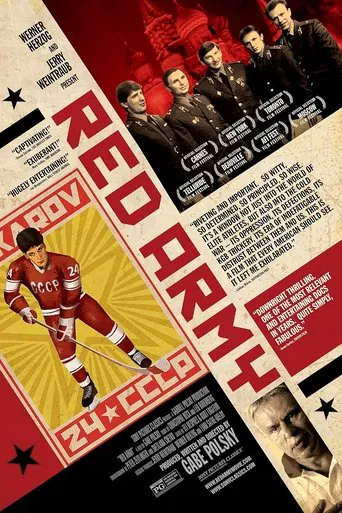

There has never been such beauty in sport than ice hockey performed by the Soviet Union at its best. How was it possible? It's pretty obvious that it all was due to propaganda reasons. The Communist human was superior, according to Soviet leaders. Or at least they wanted to think so; but the almost only way to prove it was through the athletes.The legendary Fetisov tells most of the story here. How the players were kept almost as slaves under the regime of KGB man Tichonov. And when finally the Soviet system broke down, Fetisov and his comrades were allowed to play in NHL. But had to give most of their money to the embassy.A sometimes breathtaking documentary and the system succeeded in creating some of the best athletes ever. And yes, they impressed the West. But the price was high.
... View More"Do you believe in miracles?! YES!!" That was sportscaster Al Michaels' immortal exaltation at the end of the 1980 Olympic hockey game which became known as "The Miracle on Ice". An American team of amateur and college hockey players had defeated the vaunted team from the Soviet Union, which had won the gold medal in the last four Winter Olympics and six of the last seven. The U.S. team would go on to win the gold medal by defeating Finland. The highly improbable American victory over the Russians was named by Sports Illustrated as the greatest sports moment of the 20th century and spawned a TV movie, a documentary film and the 2004 feature "Miracle" starring Kurt Russell. But what of the Soviet team? How did this shocking loss affect them? And was this the beginning of the end for Russian dominance of international ice hockey? The documentary "Red Army" (PG, 1:25) answers those questions and many more as it delves into the stories of the men behind the hockey masks and the dramatic history of their national sport.The story of the Soviet Red Army hockey program is one of athletic, social, political and military influences that reflected the larger phenomenon of the Cold War and dictated the fates of those involved. This film contains the kind of interviews that you'd expect from such a documentary and also uses little-seen archival footage, creative modern graphics and skilled editing to tell this story in a very engaging way. The main interviewee is Soviet team captain Viacheslav Fetisov who describes his story as it felt back then and apparently still feels today. Interviews with his wife, his former teammates, a former KGB agent and a few journalists tell of their experiences and give valuable color commentary, but just as revealing is what is NOT said in the documentary. Co-producer, director, writer and interviewer Gabe Polsky is smart enough to turn the camera on early, keep it rolling and edit into the film the honesty and emotion that shows itself in the candid moments and unguarded reactions of his interviewees.The film's scope covers over four decades of the Soviet Union's hockey program, but focuses mainly on the 1980s, a decade which began with Cold War tensions heightened by the Soviet invasion of Afghanistan and ended with the rapid decline of the USSR as a unified state. During this period, Fetisov and his teammates absorbed that crushing Olympic defeat, dealt with the changes that followed, rose to new challenges and, eventually, began to consider careers in the NHL, as the Soviet government gradually loosened its strong grip on its players, just as it began losing control of its people and its empire. Polsky uses all the tools at his disposal to illustrate how the Russians ran their program and what that program meant to the country. We see children from all over their massive and diverse nation training, playing and competing within the program. We observe "the best of the best of the best", as one interviewee describes them, transition from hockey players to Russian icons, and cogs in the Soviet Union's propaganda machine. We learn that these elite players were to place hockey above literally everything else in their lives. We come to understand that their purpose was to embody the superiority of their communist system. We get to peek behind the Iron Curtain and contemplate an untold story unlike any other in sports."Red Army" doesn't just reveal the untold story of the Soviet Union's ice hockey program, but helps us see that the men involved were more than their government's propaganda puppets, but were human beings with desires for their lives, both common and uncommon problems, and impressive amounts of talent and work ethic. This is a documentary that feels like a drama. The film brings openness to a notoriously closed system and tells a story that most audience members have never thought about, but will be unable to avoid thinking about after seeing this movie. The only weak spot I noticed was the soundbites of the director's amateurish interviewing techniques. That aside, this is a fascinating film which raises the bar for future documentaries of its kind. "A-"
... View MoreLeft the theater very disappointed with the movie for the exact reasons as NWIWCHAR. The interviews were embarrassingly amateurish and the movie was terribly incomplete, choppy and disjointed. In addition, there was little to nothing regarding the Summit Series in 72. Also, Herb Brook's comment was taken completely out of context as were Wayne Gretzky's. Where are the interviews with Mogilny and Bure and Federov? The Soviets, while tremendous players, in their own right, where not superior to the best Canadian players. The Summit Series in 1972 took a Soviet team that had played together for years and matched them against NHL All Stars in their off season, before training camp had started and players that had never played together on the same team. It wasn't until exhibition games in Sweden that the Canadian players (who were minus Bobby Orr, Bobby Hull and Gerry Cheevers) began to play somewhat cohesively as a team. They won three of the four games in Moscow and yes, Bobby Clarke's slash was despicable.
... View MoreI watched "The Red Army" a documentary about the Russian hockey players that dominated the world in the 1980's during the Cold War, and the human story that emerged took me completely by surprise. The film features the Russian hockey players that played on the so- called "KLM" line, which consisted of defencemen Viacheslav Fetisov and Alexei Kasatonov, and forwards Sergei Makarov, Igor Larionov and Vladimir Krutov, the best five man unit that ever played the game. I feared these guys and the Soviet Union hockey team during the 1980's, my entire country did; Canadian hockey announcers pointed out the lack of emotion in their faces when they came to visit, suggesting that they weren't human. Every young child I knew growing up was afraid of the Russians and their way of life, anti Russian sentiment flowed through pop culture, it was a Cold War, a term that baffles the Russians interviewed in the film. This documentary reminded me of how ignorant we all were, the Iron Current prevented the western world from seeing people in the Soviet Union as human beings. The propaganda in my country prevented me from recognizing the creativity and talent these hockey players possessed.Viacheslav Fetisov was the leader of the group, he treated Alexei Kasatonov like a little brother all his young life. As I watched the images of early Russian hockey I must admit there was a part of me that envied the young boys that got sent to these hockey camps. Their coach Anatoli Tarasov mentored his players, and in the old film they showed he really seemed to enjoy himself. Tarasov was unorthodox, he saw hockey as a ballet, he had his players juggle during training, and they were rolling around on the ice like gymnasts. I never knew the early history of the "KLM" line but before they were Olympians they were children, and that's what this film depicts so brilliantly. The director and writer Gabe Polsky seems very close to Viacheslav Fetisov while he interviews him, and that really helped authenticate what I was hearing.The coach that took over the Russian hockey program from Tarasov was completely different from the gentle father that wanted to inspire. Viktor Tikhonov was a military man first, and according to Fetisov he cared nothing about his players as human beings. He wouldn't let his players see their families, even when a family member fell terminally ill. The relationship between Fetisov and Tikhonov is what pushed Fetisov out of the Red Army, the Russian government agreed to let him go after his many years of service but Tikhonov took back that offer, stopping the government from letting Fetisov join the NHL. The other players on the "KLM" line were eventually told they could join the NHL, but they would have to give up half their salary to mother Russia. Fetisov held strong, he would not go to the NHL without getting permission to sign his own contract, in his mind he was finished serving the Russian government.The film demonstrates how the politics at the time reflected the lives of these young hockey players and as I watched them go through this, I found myself cheering for them for the first time. A handful of young Russian hockey players were sent out to make money for their cash starved government, a couple of them signed with my beloved Vancouver Canucks. I still here the local stories about Vladimir Krutov, while he was in Vancouver he found the North American life style very hard to adjust to. When he arrived in Canada, he couldn't get over the fact he could get a hamburger from McDonald's anytime he wanted to, he could buy soft drinks and hot dogs from the corner store any hour of the day. He ballooned in his first year, growing bigger and bigger, his new freedom leading him to over indulgence. He didn't last long in the NHL; during his interview in this movie he was very stoic, he had lost his life in hockey without his country, he seemed so distant when he spoke.The Russian culture has always fascinated me, I've regarded our two national hockey teams as the best for many years. Hockey has changed however and Russia has changed right along with it, hockey has become more about skill and less about physical intimidation. Russia is now a democracy, still in its infancy, lots of good and bad going on in that country, and dealing with political corruption is at the forefront. This film starts at the peak of the communist regime and ends in present day Russia, a democracy still haunted by its past. Viacheslav Fetisov is now working in the KHL, a league that would never exist without political change, in 2002 Vladimir Putin made him minister of Sport for Russia, he never turned his back on his country and at no point did Fetisov take the easy way out. He faced his government like the big man he is, he looked the minister of defence right in the eyes and challenged him to send him to Siberia. The courage Fetisov shows in this story impressed me the most, and I loved learning that his closest friends were five boys that loved to play hockey together.
... View More